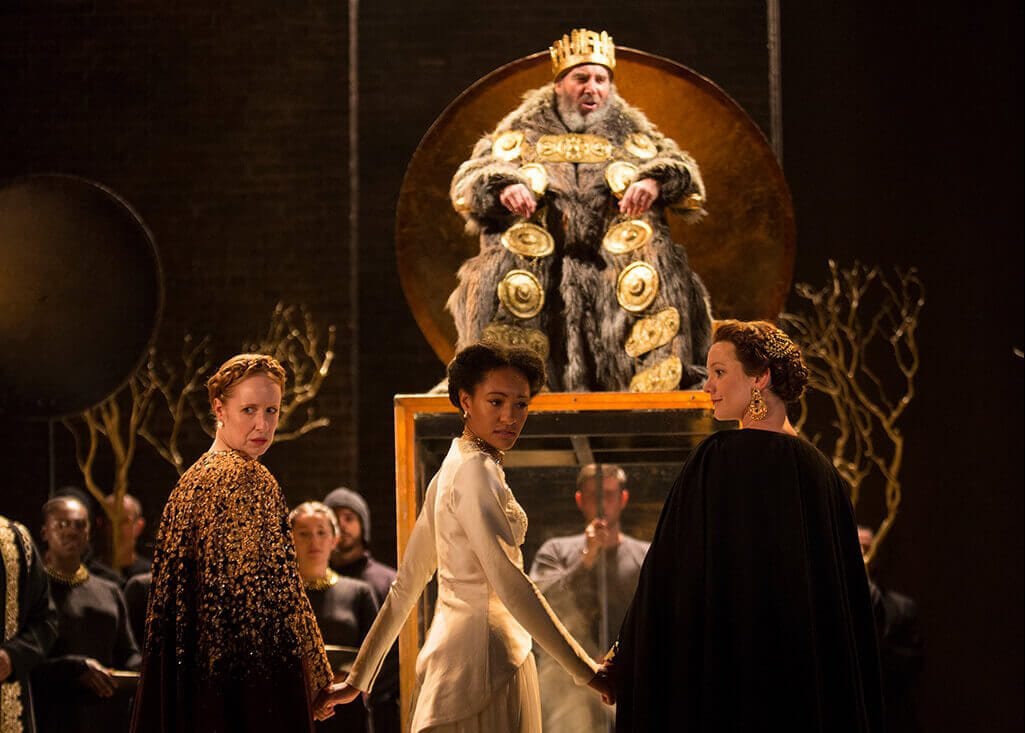This is one of the most intelligent readings of King Lear that I have ever seen. For once, you do not go just for the towering performance of Lear or any of the other players. Everything is balanced among the members of a large cast; everyone is working at a high level of commitment and understanding; everyone is working within a tight-knit ensemble. I had the sense that every single line had been thought through for all its nuances. Every line, every character and every situation of this iconic play is consistently illuminated in this production. The real star of the show, therefore, is the director, Gregory Doran, who has elicited from his team a strong, cogent reading that presents with great strength the complexities and poetry of the text and its tragic look at the world. This is a production makes you think as well as feel throughout; and also invokes comparisons to our contemporary world, to questions of political chicanery, to problems of aging, to moral issues such as honesty, loyalty and betrayal. Lear suffers from hubris; but he is also over eighty years old and that is clearly in itself some of his problem. Antony Sher’s erratic, capricious king in this production is compellingly convincing and totally plausible from the opening moments to the end. He conveys the great tenderness, rage and vulnerability of the old king and convincingly portrays Lear’s journey through madness to understanding.
Having established a community of poverty and want that surrounds this court, Lear opens with a king who is a potentate partly in the mould of an Oriental despot. Lear enters carried onto the stage in a glass cage mounted on a high platform; the imagery is not only striking but sets up a memory that echoes at relevant times throughout the show, especially when Lear sits in his chair during the period of his redemptive recuperation at his daughter Cordelia’s military camp and again when he is pushed onto the stage sitting with the dead Cordelia in his lap like a male Pieta. The early part of the play is visually splendid in Niki turner’s designs and evokes also a primitive world where we can accept the belief of the characters in their gods and curses as they invoke them. The cast is large. This production has been peopled so that you can believe in a retinue of one hundred knights; so that you get glimpses of a suffering population living in the authoritarian world of Lear and his court. As the play develops, the stage setting becomes simpler.
This King Lear proceeds with such astuteness that every aspect of the complex plotting fits together. Every line is spoken with great attention to nuance. I found myself listening to the play as I have not done in a long time; and noticing intricate meanings and subtexts throughout. The cast is clearly well-drilled; and yet the sense it gives is one of spontaneity. Also, there is a wonderful understanding in this production of how one moral or immoral step leads to the next in a chain. Nia Gwynne’s sharp and peevish Goneril and Kelly Williams’ Regan slowly descend into their innate evil and solipsism and then begin to revel in their self-justifying selfish actions. Paapa Essiedu, who was a memorable Hamlet earlier this year, is now a diabolically charming Edmund; he begins to test his successful gulling of his father and brother with glee and grows in confidence as he descends into perpetrating more tricks and grabbing at unexpected advantages. Antony Byrne is a rough spoken, salt-of-the earth Kent. The tension of the moral characters, the struggle against the unfairness of life by Edgar, Cordelia, Kent, is very strongly portrayed, as is the sense of their being right despite everything stacked up against them. Oliver Johnstone’s portrayal of Edgar is completely believable, engrossing and sympathetic. Above all, David Troughton’s Gloucester is strong enough almost to steal the show; and he makes a perfect balance for Antony Sher’s pitiable Lear. The self-delusional aspects of both men are well portrayed; and their learning curves carefully modulated. When they meet on Dover Heath, there is a sense of culmination; and much pleasures from their perfectly pitched acting.
This is an excellent, intelligent and emotionally satisfying presentation of King Lear. It eschews the traditional monumentality of the usual approaches to the play and is stronger and more compelling for that reason. The great play is well – and often surprisingly – served.




